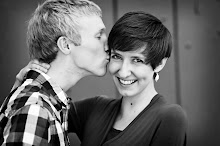In our learning, we are all like scientists. We create (or construct!) a model in our mind based on whatever information or experience is available to us. Then we act as if it is true until we discover a contradiction, and at this point we revise our model until it again fits with experience. This process is ongoing, and as such there is never a point when we are not learning; whether or not our sensory experiences oppose or support our theories. Another implication of constructivism is, because knowledge is built from experience, that there may be many different models of the same concept in a classroom . Knowledge cannot simply be transferred from teacher to student, students must build it from information provided them. If we are to be believers in this theory of Constructivism, then we know that there is no “truth” out there, just a set of theories that have not yet been contradicted.
My first thought about applying constructivism in our schools is this: “If we are never sure if our knowledge is correct or not, who are we to be the teachers?”. Then I decided that this discussion would probably not be very helpful, so I have decided to talk instead about feedback. If students are to be able to learn, they must be able to test their theories and concept models against “truth” (or whether it agrees with our supposedly more complete knowledge) and it is our job as educators to provide them with the opportunity to do so. This will be most effective if done promptly, while the construct is still fresh in the student’s mind.

I really liked your train of thought about whether teachers are justified in teaching. I also liked how you talked about us having the responsibility to help our students hit those walls that bring them to truth. I sort of had a hard time following how you were planning on doing this in your classroom. You have a lot of thoughts in the end that I liked, but I just had a hard time putting them together.
ReplyDeleteWhat we learn, or the "knowledge we construct" from any given experience is based off of our interpretations and past experiences. As you said, learning is always being done, whether we want to or not.
ReplyDeleteConstructivism does not say that there is no ultimate "truth". It merely says that we can never be certain that our understanding is the truth, because our knowledge is based off the filter of our experiences.
As teachers, we recognize that we do not know everything. However, we have had many experiences that have helped our knowledge come closer to the truth. We can help our students have similar experiences and deepen their understanding and knowledge, even if we never know if our knowledge is the ultimate truth.
That's a great idea! I think that you applied this homework assignment well to a valid way of teaching. Students need to test their knowledge and find the "truth" in it, because then they will feel more comfortable in what they believe they know. I would suggest that you go straight to the point though. The first couple sentences in your second paragraph weren't needed. Great job!
ReplyDeleteI really liked your idea about feedback. I think it is a great way for students to learn and to make sure what they are learning is correct. I felt that maybe the tone in the post wasn't very scholarly. I liked the consepts and ideas, but maybe try to word them a little differently.
ReplyDeleteI like your thought about knowledge not ever being completely true. I think it is important as a teacher to let your students explore math the best you can. Who knows what discoveries they can make!
ReplyDelete